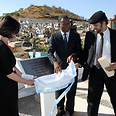
Jews of Cape Verde's past honored
Dozens of descendants of west African archipelago's Jewish community travel from Europe, US to attend rededication of long-neglected Jewish burial plot within Catholic cemetery, which has been restored with financial aid from Morocco's King Mohammed VI
The gathering in Praia, the capital of the west African archipelago, is more than just an emotional introduction among newly discovered family and friends. For its organizers, it is a potent symbol of religious tolerance.
Dozens travelled recently from Europe and the United States to attend the rededication of the long-neglected Jewish burial plot within the Varzea cemetery, which has been restored with financial help from Morocco's King Mohammed VI.
"I want to know where I come from, who I am, to know where I'm going. Without my past I have no identity, and I run the risk of losing myself," says John Wahnon, who has come from Washington, DC.
Some 350 miles (570 kilometers) off the African mainland, Cape Verde's 10 islands – a maritime waypoint between Europe and South America – were uninhabited until they were colonized by Portugal in the 15th century.
Several hundred Jews from Morocco arrived in the 19th century, starting businesses and taking up government posts while inter-marrying with the predominantly Roman Catholic majority.
Today there are no practicing Jews on the islands, let alone a synagogue.

'Without my past I have no identity.' Standing in memory of ancestors (Photo: AFP)
Wahnon says he brought up his children, now adults, to respect their Jewish heritage and identity, even though his family is non-practicing.
He came to Praia because "to remember the dead and to honor them is to show respect for the human being."
Joining 50 descendants for the re-dedication, Lisbon's Chief Rabbi Eliezer Shai di Martino prays alongside Abdallah Boutadghart, an emissary of King Mohammed, and Praia mayor Ulisses Correia e Silva.
The crowd, many in platter-shaped Jewish yarmulke caps while others wear the fez, a symbol of Islamic identity, bow their heads as the rabbi petitions God for the eternal repose of the dead.
There is no sadness among the descendants, mostly in their 50s, and the atmosphere is more akin to the sense of celebration evident at a large family get-together, forged from friendships reunited and newly formed.
Many say they feel that justice has finally been gained for the memory of their ancestors, who fled persecution in the Moroccan cities of Tangiers, Tetouan, Rabat and Essaouira.
Gesture of 'tolerance and respect'
While a large Diaspora of the descendants of the Cape Verde Jews lives around the globe, but mainly in the US, many remain among the most highly regarded families in the archipelago of a little over 500,000 inhabitants.
Jewish descent "has provided people of quality in all walks of life and also entrepreneurs who have contributed much to the development of the country," says Cape Verde's former prime minister Carlos Wahnon Veiga.
Jews are influential at all levels of Cape Verde society, where they hold important positions in shipping, politics and business, says Carol Castiel, a Washington journalist who heads the Cape Verde Jewish Heritage Project.
Wahnon's own ancestors settled in Mindelo, a bustling 19th-century port of call for transatlantic shipping that has more recently become best-known as the hometown of internationally celebrated Cape Verdean musicians including the late Cesaria Evora.
The Cape Verde Jewish Heritage Project hopes to restore other Jewish burial plots -- two on Santo Antao, across a narrow strait from Mindelo, and one on Boa Vista -- and also pursue historical research.
Without giving figures, almost everyone at the cemetery lavishes praise on King Mohammed for his financial contribution to the restoration of the Jewish graves.
He was motivated by a wider interest in preserving his kingdom's Sephardic Jewish heritage, according to Castiel.
That a Muslim would finance the refurbishment of Jewish graves in a Catholic cemetery, in a predominantly Catholic country, is "beautiful", an "extraordinary" gesture of "tolerance and respect", Veiga says.










